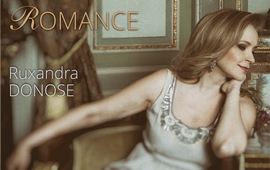> Vote the best classical album of 2014

Ruxandra Donose - the Romance Album - Music Box, 20th October, 2014
If you would like to vote for this cd please vote HERE
The album was released on 23rd September, 2014. About this album, Ruxandra Donose told Sorina Goia, the following: 'With this CD a dream has come true: it is the dream of bringing together favourite arias of mine, of the public, of everyone; known arias, along with lesser-known ones, but still favourite of mine – all of them coming from the French repertoire, which, in a large part of my career, I represent, encounter and enjoy. Werther is one of my favourite roles, especially because of Charlotte's aria, the Letter aria. The arias from Samson et Dalila are known worldwide; they have a sentimental meaning to me because, the first time I sang with a radio orchestra, on the stage of the Radio Hall, in the Do you like Opera? performance (I was a freshman in college), I sang an aria from Samson et Dalila. From the Romania's orchestras, the National Radio Orchestra is the closest to my heart – I have been growing alongside its members since childhood. Tiberiu Soare is one of the most wonderful Romanian conductors.'
As usual, in the beginning, a short tour d'horizon of the discographic release of this week. On 20th October, Puccini's opera, Manon Lescaut, is released, with Ana Maria Martinez and Andrea Boccelli as the protagonists, an album you were able to listen to on Opera in Famous Performances on 19th October, and which you can listen to again anytime on the Vote for the Best Classical Album of 2014 campaign website.
And, on 24th October, a new album, recorded by Daniel Barenboim and Martha Argerich, will be released – works for two pianos, by Mozart, Schubert and Stravinsky, interpreted by two titans of the contemporary piano. This album, which I invite you to listen to next week (on 27th October, at 19:00), on Music Box, the programme with discographic news on Radio Romania Music.
Romance ….
… is the newest album of the mezzo-soprano Ruxandra Donose, recorded in April 2014, with the National Radio Orchestra, conducted by Tiberiu Soare and which was released by the 'Casa Radio' Publishing House on 23rd September, 2014, during the RADIRO Festival. The album is included in the Vote for the Best Classical Album of 2014 campaign.
About this album, Ruxandra Donose told Sorina Goia, the following: 'With this CD a dream has come true: it is the dream of bringing together favourite arias of mine, of the public, of everyone; known arias, along with lesser-known arias, but still favourites of mine – all of them coming from the French repertoire, which, in a large part of my career, I represent, encounter and enjoy.
Werther is one of my favourite roles, especially because of Charlotte's aria, the Letter aria. The arias from Samson et Dalila are known worldwide; they have a sentimental meaning to me, because, the first time I sang with a radio orchestra, on the stage of the Radio Hall, in a 'Do you like Opera?' spectacle (I was a freshman in college), I sang an aria from Samson et Dalila. From Romania's orchestras, the National Radio Orchestra is the closest to my heart – I have been growing alongside its members since childhood. Tiberiu Soare is one of the most wonderful Romanian conductors.'
The critic's opinion
The album enjoys the appreciation of the music critic Cristina Sârbu. I am quoting a chronicle published on the Radio Romania Music website: 'I first started listening to the recordings with the lucidity of the chronicler who is eager to understand and appreciate with her mind. I could not resist long the beauty of the voice, the delicacy of the interpretation, the pronunciation of each word, the sensation that goes through and beyond the music clouded my judgement and brightened my soul. The singer has on her side an orchestra and a conductor which not only understand and support her but also … love her for the way she understands, not how to make, but how to live and transmit the music. In these recordings, Ruxandra Donose, the National Radio Orchestra and Tiberiu Soare form an indestructible artistic unity, which operates only and only for the benefit of returning the Great music to the public; an enterprise and an achievement which must be cherished and honoured.'
Translated by Izabela-Elvira Vațe and Elena Daniela Radu
MTTLC, The University of Bucharest














